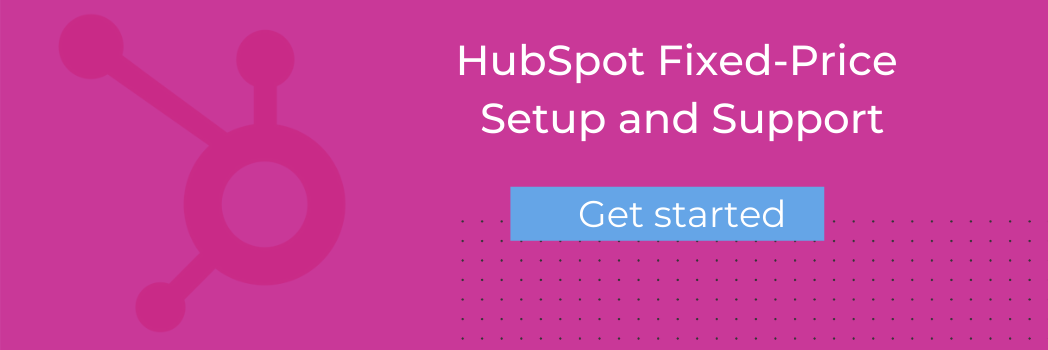Often, we find that people ask up a lot of questions surrounding whether Marketo or HubSpot is more suitable for their business. This is another one of those questions where the answer follows more of a multi-tiered answer tree, rather than having a one or the other answer.
Of course, that’s actually a positive, as based on your specific business function and needs, you’ll be able to get stuck in with the platform that will suit your functionality the most appropriately. So, let’s see which software will work best for you and your needs!
We work with HubSpot because it fits our needs better, but we also recognise that Marketo can be a powerful platform – for the right business.
What is a CRM?
CRM stands for Customer Relationship Management, and a CRM is a system, technology or platform that enables you to manage your interactions with customers and prospects. Among a vast array of functionalities, it helps you to better organise your business, automate tasks, centralise data and grow your business (when used correctly).
Let’s look at the main differences between HubSpot and Marketo …
Pricing
A notable drawback of Marketo is its complicated pricing structure. The potentially headache-inducing costs of their tools and different product packages doesn’t make it particularly easy to deduce how much you can expect to pay for the tools your business requires. Marketo features seven main modules, which are:
- Lead management
- Email marketing
- Consumer marketing
- Customer-based marketing
- Mobile marketing
- Revenue attribution
- Account-based marketing
Obviously, you might not have a need for all of these modules so you can purchase them in bundles or individually – depending on your business requirements.
It’s worth keeping in mind that, if you’re a smaller business or just finding your feet, Marketo has a reputation of being one of the most expensive options on the market. While you pay for quality, marketing automation is all about ROI so if you’re going to be splashing out more than you’re bringing in, you’re not going to be winning.
When it comes to HubSpot, the platform is a single system designed with scaling businesses in mind. As your database grows, you can upgrade your membership across certain elements of the CRM. All of their features are accessible at an entry-level basis. There are also a range of bolt-ons, which you can utilise when you have the need, to enhance your marketing, sales, or reporting.
HubSpot offers three different product levels: Starter from £38 a month, Professional from £655 a month and Enterprise from £2,624 a month. Marketo doesn’t have a replicable pricing analysis, you would need to contact their sales team to find out more.
User experience
Marketo specifically targets solutions aimed at enterprises and larger businesses. Because of this, their software usability is focused a little more towards advanced marketers and IT specialists. The functionality provided by Marketo is vast – but unlocking the functionality can be more challenging than the user friendliness and smooth UX provided by HubSpot.
With HubSpot, you can access all the marketing tools on the Professional and Enterprise levels. There is no requirement to buy separate modules and tools, which can add up quickly! HubSpot is the better option for small and medium size businesses but is also as good as Marketo when it comes to larger business functionality.
HubSpot was also designed specifically to be easy to use for marketers, so you’ll find it a lot more accessible if you’re not already well-versed in marketing automation software.
Versatility
Marketo has the capability to offer personalised, industry specific marketing solutions. The seven modules of marketing they cover can be bought separately or in bundles (as we touched on). This means that, as a complete product, Marketo may potentially provide a more in-depth coverage on each module, but that does come with a bigger price tag.
HubSpot, in comparison, is itself a very powerful CRM platform. You have the ability to create web pages (beautiful ones at that – with no dev need… hurrah!), emails, and optimised content for blogs. You can create reports and check analytics too – all in one place with top tier user-friendliness. Moving up the pricing tiers gets you access to either more tools, or more options within those tools, but even the free version comes with a lot of functionality if you’re dipping your toe in the water.
HubSpot also tout their Integration Ecosystem, with over 1,000 external tools you can integrate to give your marketing even more oomph!
CRM Integration
When it comes to CRM integration, Marketo was built with Salesforce which means, across the industry, Marketo offer possibly the best and most innovative Salesforce integrations. You also get the possibility of native integrations with Microsoft Dynamics and SAP if you go with Marketo.
HubSpot, by comparison, is a CRM platform through-and-through. You can integrate with the most popular systems including Salesforce, Microsoft Dynamics, Zoho and many more, but you also don’t need an external integration and can easily migrate to HubSpot CRM directly.
Marketo’s CRM integrations are more advanced, but they cannot boast the significantly better user-friendliness provided by HubSpot due to its CRM platform being its core function. The result is a powerful CRM with ease-of-use and a unified back-end experience.
Analytics
You shouldn’t need any reinforcement of the importance of data behind all of your marketing activities. Successful campaigns are driven by invaluable insights from rich data about your business, consumers, and prospects.
One of our favourite things about HubSpot is their built-in analytics tools which enable you to easily and effectively analyse your website’s performance, marketing performance, and even sales team performance. You can track your marketing funnel right the way through and make sure all your key decisions are data-driven, smart, and helping you to achieve your business goals.
HubSpot’s Multi-Touch Revenue Attribution helps to easily see the impact your marketing team is having, which marketing activity is delivering the greatest ROI, and give the credit where credit is deserved for your business growth.
With Marketo, performance insights are available as an addon but are not a foundational part of your package as they are with HubSpot. This means you need to budget extra if you want to be able to do a deep dive into your data (which you should want to – the whole benefit of an integrated system is being able to gather and analyse a tonne of data).
What are the Benefits of HubSpot?
HubSpot is not only a powerful tool, but also has exceptional customer service as well as an extensive Knowledge Library to assist you in all matters HubSpot. HubSpot’s marketing Hub’s user experience and interface goes above and beyond the platform itself and you can truly have an exceptional experience without any prior web-dev experience. The Ecosystem boasts a vast choice of integrations to fulfil almost any need you may have, and each integration is fully vetted by HubSpot so you know there will be top-tier functionality.
When we look at HubSpot Enterprise, it’s important not to undervalue features like Multi-Touch Revenue Attribution, account-based marketing and partitioning. We truly believe that HubSpot is a great solution for even the most complex use cases – something largely attributed to the fact that the whole platform was built from the ground up, rather than being bolted together from acquisitions.
What are the Benefits of Marketo
The modular design of Marketo is very useful, providing a strong ability to customise your use of the system to get a unique and tailored solution to best fit your business needs. Their pricing diversity also means that you can find the price tag that will work for your business (even if it is a comparatively higher price tag than that of their competitors).
When it comes to the biggest benefit or using Marketo, it’s hands-down its level of integration with Salesforce. If you are signed, sealed, and delivered with using Salesforce and won’t be budged, Marketo does have the most innovative and seamless integration in the industry.
Conclusion
Marketo is an industry leader in marketing automation and will enable you to deliver strong automation campaigns driven by user-behaviour in your website or products. However, its downfalls in user experience and customer service allow HubSpot to swoop in and take two strong wins on those fronts.
Marketo’s biggest struggle is no doubt it’s usability. While it’s a very powerful tool, it’s very possible you may have to end up hiring a specialist to assist you in unlocking the full potential that Marketo has.
If you’re still not sure which platform would work best for you, you can sign up for a 14-day free trial with HubSpot, which provides ample opportunity for you to assess the suitability of the platform for your business. Or even start with the free CRM and tools, to see if you’ll want to expand into the paid tiers.
If you’re looking for a HubSpot partner to show you the true potential your business could achieve when maximising the utility of HubSpot – get in contact with us for a free consultation.








